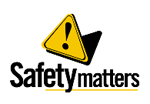 A safety culture doesn’t just happen: it takes time to cultivate and grow. One of the dedicated “safety agronomists” at the laboratory is Leon T. Reed. He has worked at Argonne for more than 20 years in a variety of safety positions and has helped to develop Argonne’s safety culture.
A safety culture doesn’t just happen: it takes time to cultivate and grow. One of the dedicated “safety agronomists” at the laboratory is Leon T. Reed. He has worked at Argonne for more than 20 years in a variety of safety positions and has helped to develop Argonne’s safety culture.
One of the challenges ES&H safety coordinators, like Reed, face today is encouraging scientists and academics to adapt and comply with the new safety culture needed for U.S. Department of Energy (DOE) laboratory facilities. This new safety culture is necessary because of the extreme voltages required, the large and dangerous apparatuses involved, the extreme temperatures and the experimental setups needed to perform the research.
“In this environment, a mistake or misfortune can cost not just time or money, but there is the real potential for long-term serious injury and loss of life,” said Reed. Sometimes there is pushback from some who feel the procedures and processes needed to pass risk assessments and move projects forward is too cumbersome. To overcome these obstacles, ES&H professionals like Reed encourage, foster and grow the new safety culture.
Reed relies on his stellar background knowledge, skill set, peer credibility and excellent work ethic to keep projects moving forward and in accordance with Argonne and DOE safety guidelines. Having a strong understanding of what a project requires in terms of safety while understanding what the scientists, engineers and researchers are trying to achieve is paramount. Reed’s ability to learn the project goals, critical milestones and technical hurdles facing the project leaders is necessary in ensuring they are performing work safely.
“The emphasis on documentation and training is an important part of safety that cannot be sidelined or forgotten,” says Reed. “Paperwork and standard practices can insure that all people associated with a project — from students and visitors to full-time personnel — know and understand the procedures as completely as possible,” says Reed. Reed advises postdocs and all personnel alike to take the time they need to learn processes, procedures and practices completely.
“You are in a unique position when you first join a project,” says Reed. “You can make a difference in the safety culture within your group. Surely you have the knowledge and background to carry out the experiments and tasks. Nevertheless, each set-up varies, and the equipment is perhaps different from what you used in the past.” Reading through the paperwork, checking one’s work and walking through procedure will keep everyone on the same page, but that is not all that is required.
“Safety has to be your passion,” advises Reed, “Much like a minister, you must preach safety to those who may be complacent, may be openly hostile, may be non-committal, or otherwise want help to improve their work environment.”
 Leon T. Reed (HEP) has worked at Argonne in the High Energy Physics Division for more than 20 years in various roles. He has worked on the ZEUS and ATLAS particle detectors and has been to Hamburg, Germany and Geneva, Switzerland to perform work.
Leon T. Reed (HEP) has worked at Argonne in the High Energy Physics Division for more than 20 years in various roles. He has worked on the ZEUS and ATLAS particle detectors and has been to Hamburg, Germany and Geneva, Switzerland to perform work.
Currently, he serves as Division ES&H Safety Coordinator and lives in a world of compliance and regulatory demand.

